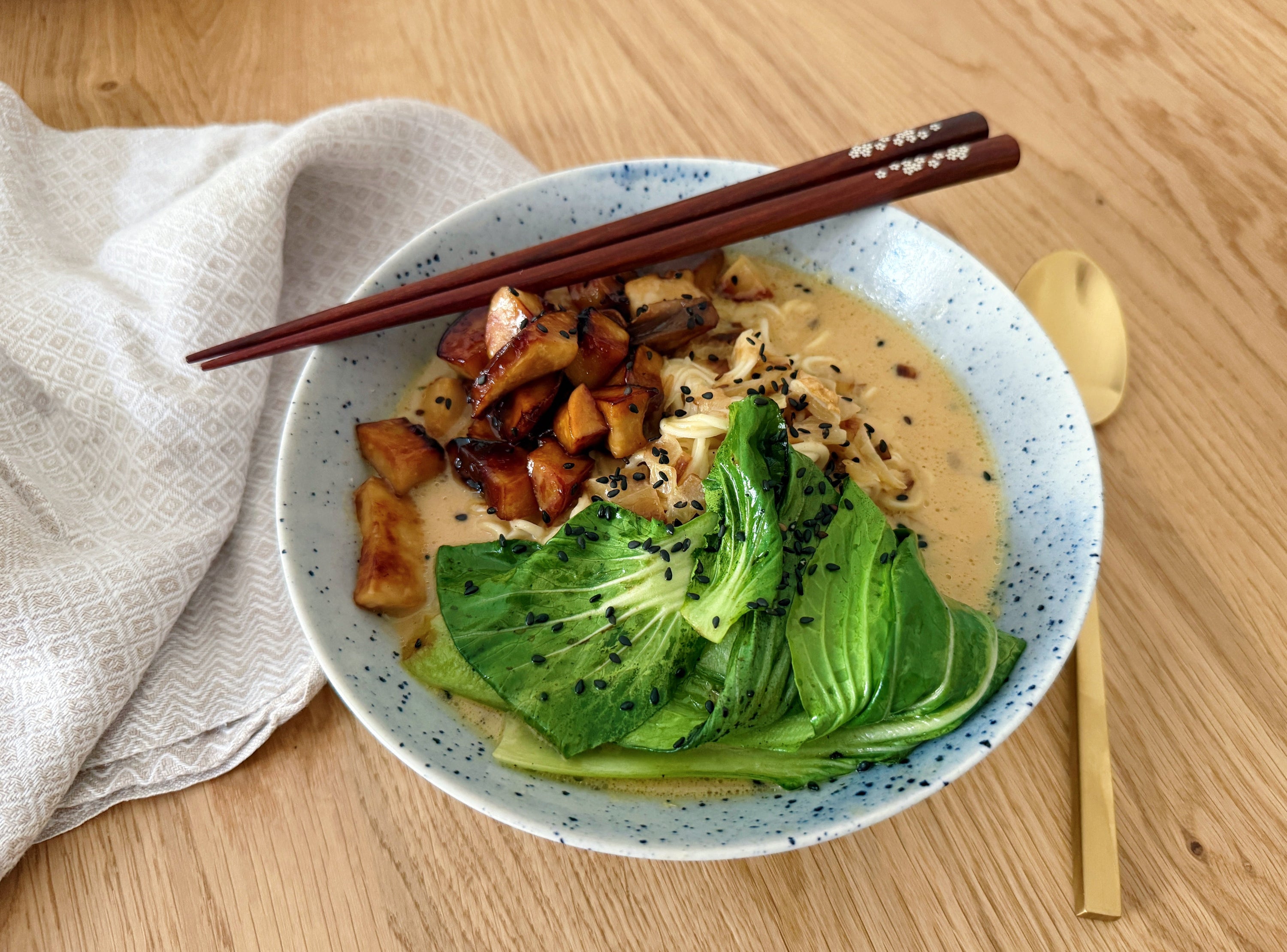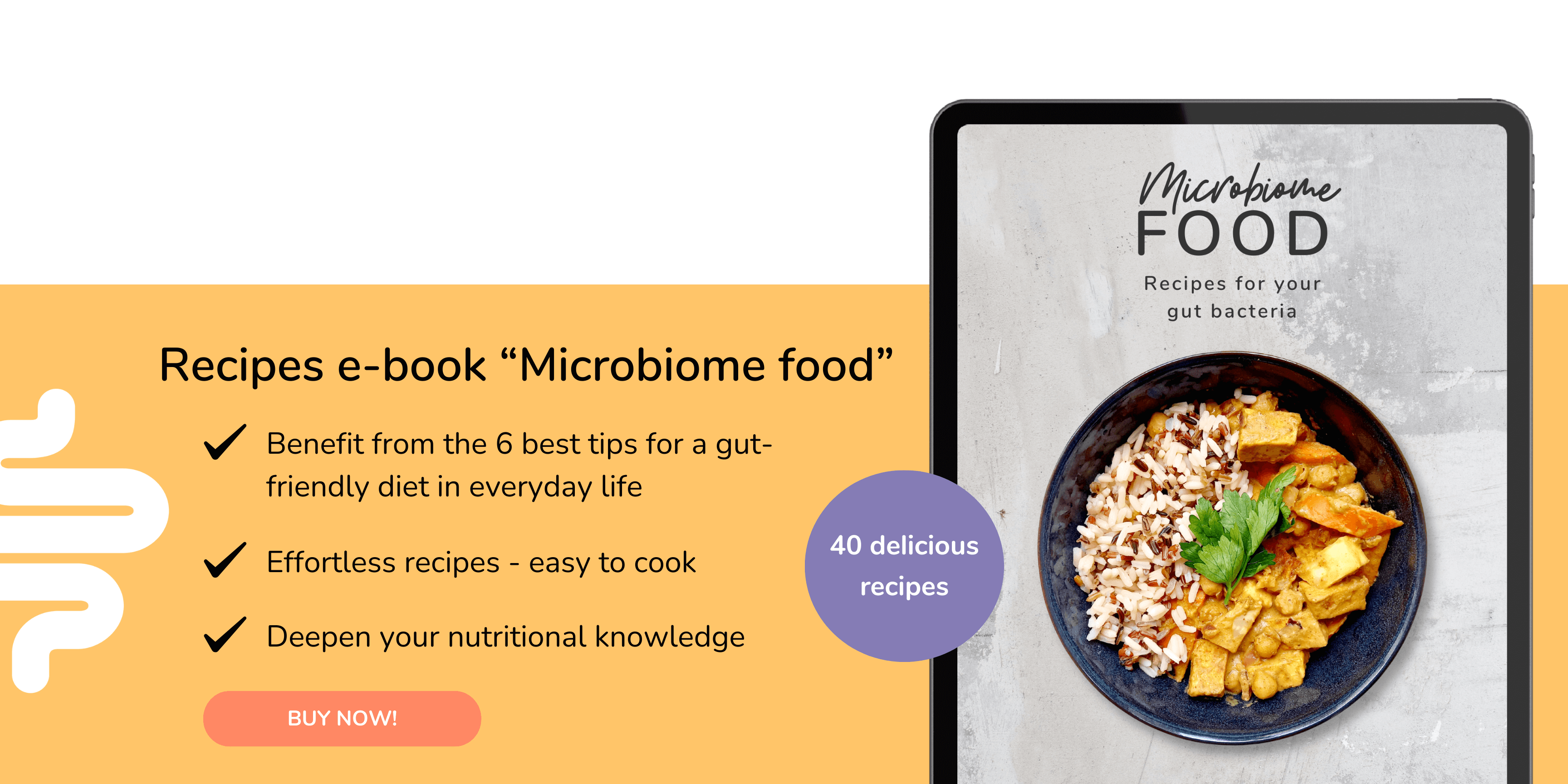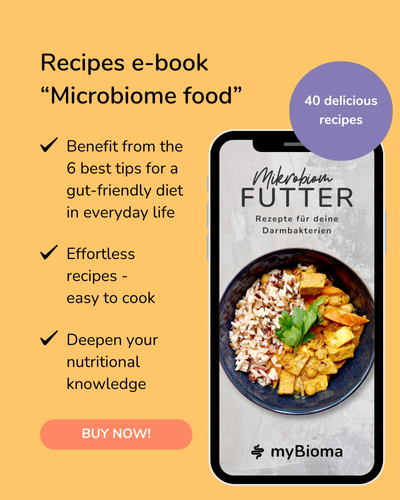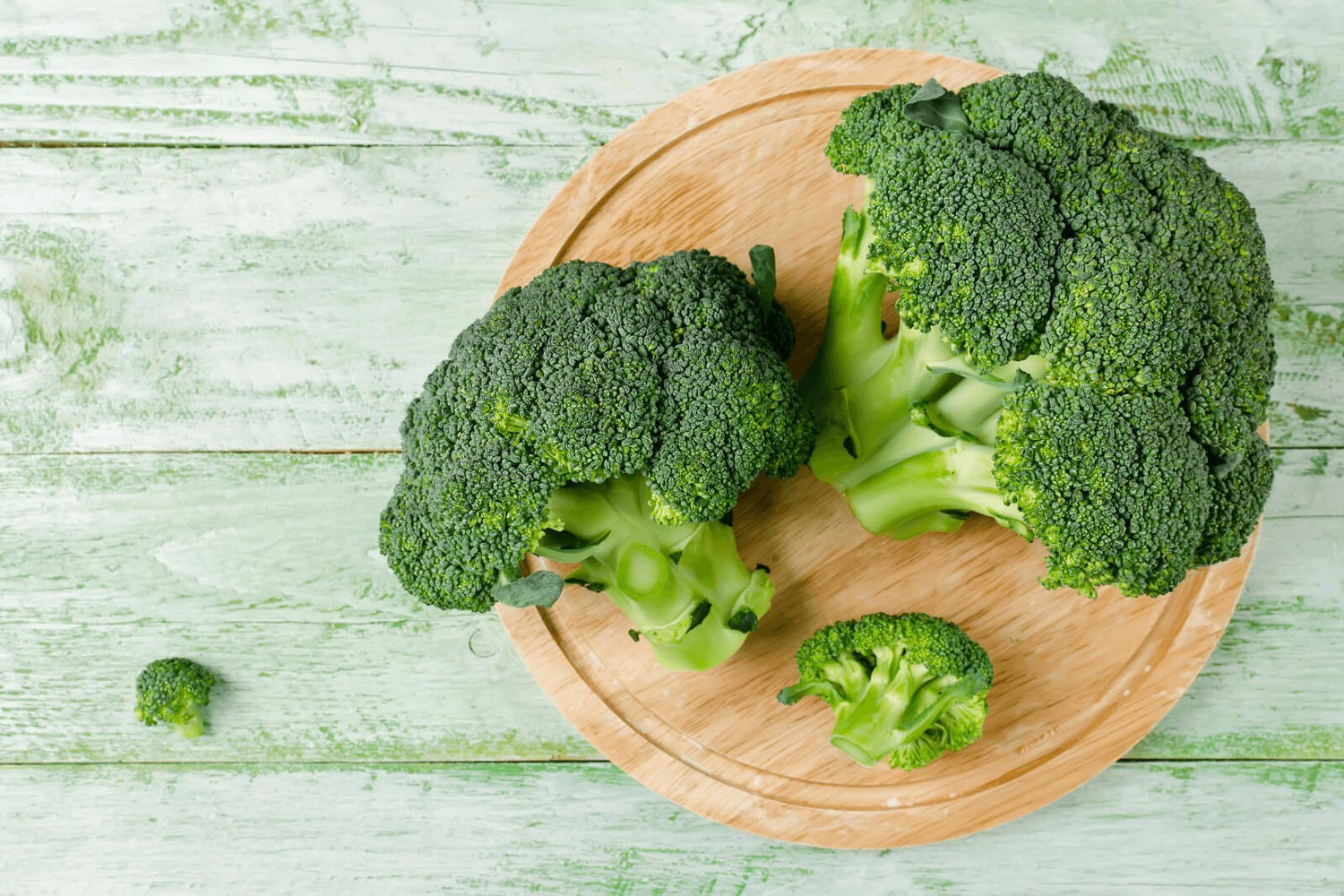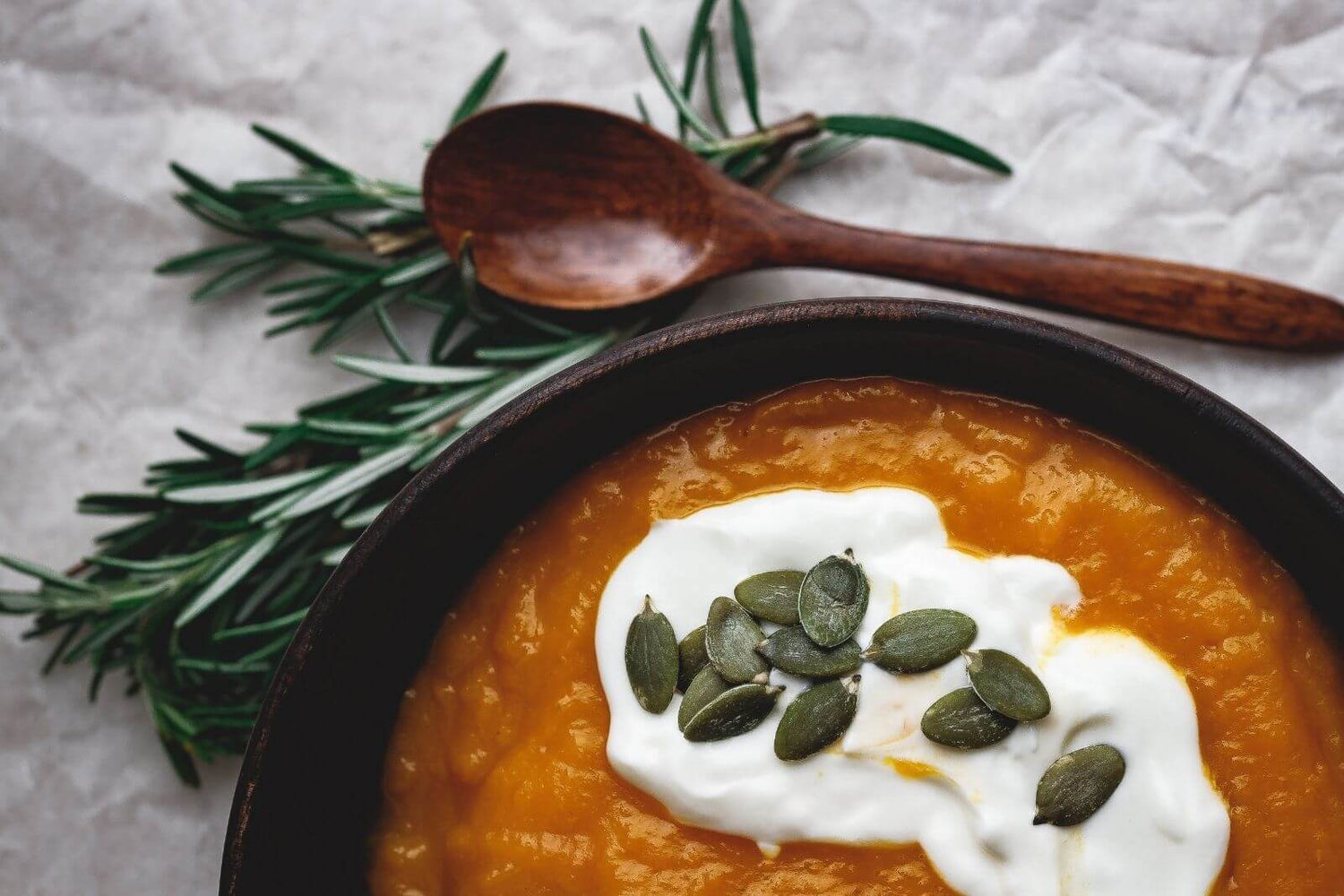January welcomes us with frosty temperatures and awakens the longing for comforting warmth. While a beach holiday might still be a distant dream, we’re bringing warmth from the inside out with delicious comfort food – like a steaming bowl of pumpkin ramen with mushrooms. This hearty soup nourishes your body and delights your taste buds with the umami-rich flavour of oyster mushrooms and the savoury depth of miso.
What is ramen anyway?
Ramen is a versatile Japanese noodle soup based on a flavorful broth made from vegetables, meat or fish and seasoned with miso or soy sauce. It features special ramen noodles made from wheat (or gluten-free alternatives for people with celiac disease or gluten sensitivity) and is typically topped with ingredients like eggs, meat, tofu, vegetables, seaweed, or spring onions.
As we embrace Veganuary – a perfect opportunity to explore the benefits of a plant-based diet, which also works wonders for a healthy gut microbiome (read more in our blog article: Plant-based diet increases beneficial gut bacteria) – we’ve opted for a vegan ramen recipe. But don’t worry, we haven’t sacrificed the rich, savoury umami flavour that makes ramen so special. Oyster mushrooms and miso paste take centre stage, lending the dish a delightful depth and a wonderfully umami-rich profile.
PS: "Instant ramen" available in supermarkets is usually full of additives that can harm your gut microbiome. Plus, the absence of fresh vegetables means they’re low in fibre and vitamins. For the sake of both your health and flavour, it’s definitely worth preparing your own ramen using fresh ingredients rather than relying on pre-packaged options.
With that in mind, let’s get cooking – here’s the recipe for our delicious and gut-friendly pumpkin ramen with mushrooms.

This delicious ramen soup is waiting for you to cook and enjoy its rich taste.
Ingredients
- 1 tablespoon coconut oil
- 1 onion, chopped
- 2 garlic cloves, sliced
- 1 tablespoon ginger, chopped
- 3 tablespoons miso paste
- 200 g pumpkin puree*
- 1 can of coconut milk
- 1 litre of vegetable broth
- 1 tablespoon sesame oil
- 1 pack of ramen noodles (or a gluten-free alternative)
- 2 pak choi
- Black sesame seeds (optional)
For the mushrooms:
- 3 oyster mushrooms, chopped (approx. 100 g)
- 2 tablespoons sesame oil
- 1 tablespoon rice vinegar
- 1 tablespoon maple syrup
- 1 teaspoon soy sauce
Preparation
- First, marinate the mushrooms: Mix sesame oil, rice vinegar, maple syrup and soy sauce in a large bowl. Add the mushrooms and mix thoroughly with the marinade. Cover the bowl and place it in the refrigerator for at least 30 minutes so that the mushrooms can absorb the flavors.
- Meanwhile, let's start with the soup: Heat a large pot, add some coconut oil and fry the onion cubes with a pinch of salt for 2 - 3 minutes over medium heat until translucent. Then add the garlic and ginger and fry everything for another 2 - 3 minutes until a wonderful aroma is released.
- Now add coconut milk, pumpkin puree and vegetable stock to the pot. Let the mixture simmer over medium heat for 7 - 10 minutes, stirring occasionally.
- While the soup is cooking, prepare the noodles in a separate pot according to the package instructions. Then drain and set aside.
- Now it's time for the mushrooms: Heat a large pan and fry the marinated mushrooms together with half of the marinade for 5 - 7 minutes until they deepen in colour. Stir occasionally and then set the mushrooms aside.
- Add the sesame oil to the ramen broth and let it simmer covered for another 5 - 10 minutes. Then turn off the heat. Dissolve the miso paste in a small jar with a little hot broth, stirring continuously and then add the mixture to the soup. This preserves the taste and probiotic properties of the miso.
- Finally, fry the pak choi in the "mushroom pan" for about 30 seconds on each side until golden brown.
- Now it's time to serve: Place the ramen noodles in soup bowls, pour the broth over them, and top with the mushrooms and pak choi. For an extra touch, sprinkle some black sesame seeds on top.
- Enjoy your comforting pumpkin ramen with mushrooms – bon appétit!
*Note on pumpkin purée: If available, you can use store-bought pumpkin purée from a jar or can for this recipe. However, it tastes even better when you make the purée yourself: Simply chop a pumpkin (such as Hokkaido, butternut, or muscat pumpkin) into pieces and roast it in the oven at 180°C (350°F) for about 25–30 minutes, until soft. Then, blend the pumpkin pieces with a mixer until smooth and creamy. The homemade pumpkin purée will keep in the fridge for a few days or can be frozen in portions.
Tip: Depending on your preference, you can add chilli oil, fried tofu, fresh coriander or sprouts to your soup. If you want to learn how to easily grow sprouts yourself, check out this blog post: Sprouts: Superfood from the windowsill
Oyster mushrooms: tender, tasty and full of nutrients
Oyster mushrooms are not only a culinary delight, but also have numerous properties that make them a valuable addition to a healthy diet:
- Proteins: Oyster mushrooms impress with their relatively high protein content, delivering 2–3 grams per 100 grams of raw weight. What truly sets them apart is not just the quantity but especially the high quality of the proteins they offer- providing a range of essential amino acids that the body cannot produce on its own and must therefore obtain through food. Additionally, the proteins are in a form that our bodies can easily digest (1).
- Fibre: Oyster mushrooms can support your digestion and heart health due to their fibre content. Particularly noteworthy is their high level of pleuran – a prebiotic fibre belonging to the beta-glucan family. These fibres promote the growth and activity of beneficial gut bacteria. Pleuran is also particularly known for its positive effects on the immune system (1). For more information about dietary fibre, check out this blog article: Health effects and tips for a fiber-rich diet
- Vitamins and minerals: Oyster mushrooms provide vitamin C, B vitamins and, when grown outdoors, even the “sunshine vitamin” D (2). As a result, these mushrooms can have positive impact on your immune system, energy metabolism, and nervous system, and contribute to effective cell repair and blood formation. Additionally, the minerals they contain, such as iron, zinc, selenium, and potassium, offer further benefits (1).

Oyster mushrooms always grow in clusters, thriving in cool weather and high humidity.
Oyster mushrooms have a delicate texture and develop a rich umami flavour (meaty, savoury, and full-bodied) when cooked. Before preparation, the mushrooms should not be washed but gently cleaned with a brush or a piece of kitchen paper. They should be stored in the refrigerator, but only for a few days, as they spoil relatively quickly.
By the way: The white coating on oyster mushrooms is not mould but their mycelium. It’s completely harmless and can be eaten without any concerns.
Miso: the savoury secret for health and flavour
Miso is a traditional Japanese fermented seasoning paste made from soybeans and either rice or barley. The fermentation is carried out by Aspergillus oryzae, a fungus commonly known as Koji mould. This process converts carbohydrates into simpler sugars and amino acids, resulting in the characteristic umami flavour we all love. There are various types of miso pastes, differing in taste intensity and fermentation duration, which typically ranges from a few months to two years. Miso is packed with minerals, B vitamins, vitamin E, vitamin K, and folic acid. As a fermented food, it also provides probiotic bacteria that support gut health (3,4).
Note: To benefit from the probiotic properties of miso, avoid heating it, as high temperatures can destroy the live bacteria. This is why we stir the miso paste into the soup only at the very end of the cooking process.

Miso varies in colour depending on the type, ranging from light beigeand yellow to deep brown and reddish hues.
By the way: Miso has a very high salt content of around 10%. Normally, high salt consumption can increase blood pressure and thus contribute to an increased risk of cardiovascular disease. Interestingly, various studies show that, despite its salt content, miso does not have a negative effect on blood pressure - unlike pure salt in the same amount. The exact reason for this has not yet been fully researched, but it is assumed that certain ingredients in miso reduce the activity of the sympathetic nervous system, which is responsible for raising blood pressure (3).
In our recipe e-book “Microbiome Food” you can expect even more delicious and healthy recipes, exciting facts about nutrition and step-by-step guides to help you easily learn how to ferment foods at home.
References
- Piska K, Ziaja K, Muszynska B. Edible mushroom pleurotus ostreatus (Oyster mushroom) – Its dietary significance and biological activity. Acta Sci Pol Hortorum Cultus Ogrod. Sep 28, 2016;16:151-61.
- Cardwell G, Bornman JF, James AP, Black LJ. A Review of Mushrooms as a Potential Source of Dietary Vitamin D. Nutrients. October 13, 2018;10(10):1498.
- Kusumoto KI, Yamagata Y, Tazawa R, Kitagawa M, Kato T, Isobe K, et al. Japanese Traditional Miso and Koji Making. J Fungi. July 2021;7(7):579.
- Rahul K. Health benefits of soybean and soybean based food products. Pharma Innov. July 8, 2021;10:1135-8.


